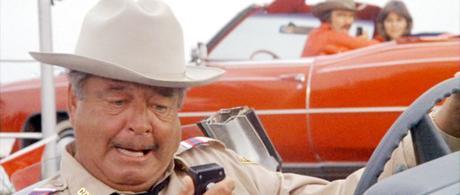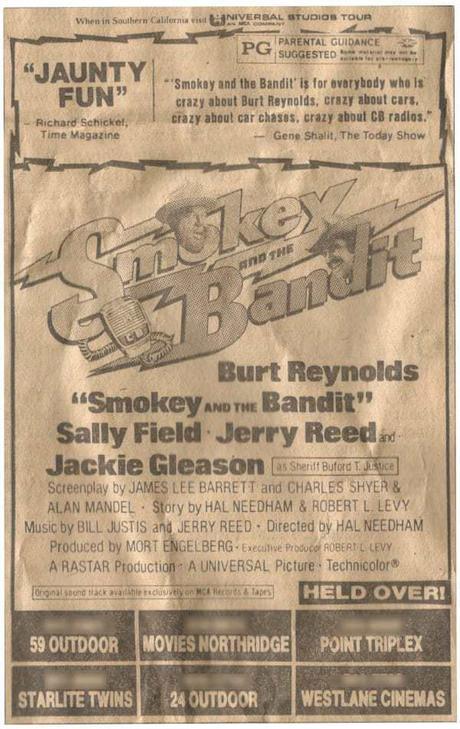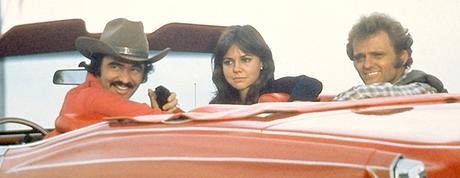
Let's play a little game. I'm going to give you two different groups of movies, and you have to figure out what they have in common. You might notice that all of the films came out in either the 1970s or 80s. That's not the common variable I'm looking for.
Spoiler Alert: If you've read the title of this article you probably know where I'm going with this, but, c'mon, humor me.
Group #1:- The Magic Garden of Stanley Sweetheart
- Beneath the Planet of the Apes
- Pufnstuf
- Big Jake
- Z.P.G.
- The Other
- Daisy Miller
- Cornbread, Earl and Me
- Alien
- The Shining
- Rocky 3
- Return of the Jedi
- Indiana Jones and the Temple of Doom + Indiana Jones and the Last Crusade
- A View to a Kill
- Rambo 2 and 3
- Beverly Hills Cop 2
- Crocodile Dundee 2
Other than Beneath the Planet of the Apes and maybe Daisy Miller (because you might have read the book in high school), most people have never heard of the films in the first group whereas just about everyone has heard of the blockbusters in the second group. So, what could these seemingly random films possibly have in common? They all came out over Memorial Day, just like Star Wars (back when it was just Star Wars, not Episode IV: A New Hope). Group #1 is Hollywood's pre- Star Wars version of Memorial Day; Group #2 is Memorial Day post- Star Wars. Almost all of the films in the former flopped, and almost all of the ones in the latter enabled raging coke habits among Hollywood producers in the 80s.
Don't worry. This isn't going to be another " Star Wars changed the universe" article, an argument so common that Mashable turned it into an entire book. I'm not here to talk about what Star Wars meant for the way movies are marketed and merchandised nor the influence it had on the types of movies Hollywood prioritized. Instead, I am more interested in what Star Wars meant for when movies are sold.
Far too often, we assume the following to be true:
"Memorial Day Weekend has always been a popular time for studios to trot out their best prospects, and being the highest grossing film of the weekend is a coveted accomplishment."
That's what DenofGeek recently argued in its list of the 10 Highest-Grossing Memorial Day Weekend Movies.
Cue up the counter-argument:
"A dead date, the deadest date in the history of movies."
That's how former 20th Century Fox Senior Vice President Alan Ladd, Jr. described the 1977 view of Memorial Day in Tom Shone's 2004 book Blockbuster: How Hollywood Learned to Stop Worrying and Love the Summer.
They're both right and wrong. Memorial Day weekend has not always been a popular time for studios, but it has been ever since Star Wars. On the other end, when Ladd was staring down a Memorial Day release for Star Wars because Fox's marketing department determined anything with "star" or "war" in the title was box office poison he was right to feel despondent. Fox was more or less dumping Star Wars in what was thought, at the time, to be a dead weekend.
Ladd panicked and revived the old, but very illegal practice of block booking to force theaters to show Star Wars over Memorial Day in exchange for the right to show the surefire hit The Other Side of Midnight in June. It worked, just barely. Star Wars opened on a mere 42 screens. The Other Side of Midnight came and went, but Star Wars played in theaters for over a year, ending its run as the highest-grossing film of all time, domestically and worldwide.
Of course, Star Wars was hardly what we now think of as a Memorial Day release. In fact, by opening in a few theaters and adding more over time (as opposed to opening in every theater imaginable right away) its release strategy more resembles Love & Friendship than X-Men: Apocalypse. However, time and time again in film history when Hollywood collectively decides certain release dates are box office poison all it takes is one big surprise hit to change minds.
1977 actually had two of those. Star Wars opened on May 25, the Wednesday before Memorial Day. It opened at mid-week because Fox was desperate get the jump on: Smokey and the Bandit.
 At that point, Burt Reynolds was one of the biggest film stars in the world. He'd already been in Deliverance and The Longest Yard, and posed nude for Cosmopolitan. However, Smokey and the Bandit was a glorified B-movie whose budget had been slashed two days before production. Reynolds' star power was being counted on to ensure a modest profit, but just like Fox with Star Wars Universal didn't quite realize what they had on their hands. They dropped Smokey on May 27, the Friday before Memorial Day, and it turned into the highest-grossing film of Reynold's career (until 2005's Longest Yard remake).
At that point, Burt Reynolds was one of the biggest film stars in the world. He'd already been in Deliverance and The Longest Yard, and posed nude for Cosmopolitan. However, Smokey and the Bandit was a glorified B-movie whose budget had been slashed two days before production. Reynolds' star power was being counted on to ensure a modest profit, but just like Fox with Star Wars Universal didn't quite realize what they had on their hands. They dropped Smokey on May 27, the Friday before Memorial Day, and it turned into the highest-grossing film of Reynold's career (until 2005's Longest Yard remake).
 Star Wars and Smokey took the top 2 spots respectively on 1977's list of highest-grossing films. Star Wars banked $302m, followed by Smokey and the Bandit 's $126m. Those totals would be $1.17 billion and $484m at current ticket prices respectively.
Star Wars and Smokey took the top 2 spots respectively on 1977's list of highest-grossing films. Star Wars banked $302m, followed by Smokey and the Bandit 's $126m. Those totals would be $1.17 billion and $484m at current ticket prices respectively.
Two years later, Fox repeated its Star Wars-Memorial Day experiment with Alien, which opened in 91 theaters and eventually expanded to just under 800. It ending its run as the 6th highest-grossing film of 1979.
That was the end of Memorial Day being seen as "deadest date in the history of movies." It was now prime real estate on the movie release calendar, the official start to the summer movie season. But why did it take Star Wars, Smokey and the Bandit and Alien to bring about this change?
For one thing, for over half of the 20th century the length of the school year in the United States fluctuated wildly by region. According to the American Education Research Association, "It wasn't until the 1960s that the present school schedule of 170 to 180 days, 5 days a week and 6.5 hours a day became the norm in most school systems." As such, you couldn't assume that by Memorial Day most kids would be out of school and reachable with a big movie, not that movies were targeted at kids back then the same way they are now.
Moreover, it's easy to forget this, but the modern version of Memorial Day is barely older than Star Wars. The concept behind the holiday goes back to the Civil War when the North created Decoration Day to honor its fallen soldiers. Thus it was that from 1868 to 1970 the United States observed Decoration Day every May 30th, regardless of which day of the week it fell on. People took to calling it Memorial Day after WWII, but that did not become its official name until 1971. At that same time, it was also turned into a federal holiday observed on the last Monday in May to create a three-day weekend. It took several years for all 50 states to officially recognize this new version of the century-old holiday.
With all of that change and instability, Hollywood was understandably late to figuring out how to properly monetize Memorial Day. Sure, there had been Memorial Day box office hits in the past, like Beneath the Planet of the Apes (1970), Midnight Cowboy (1969) and The Detective (1968), but those all predated the time when the holiday was easy to schedule around. Instead, the studios planned their summers around July 4th, typically rolling out their biggest movies in the weeks immediately preceding the holiday. So, summer was really mid-June to Labor Day (i.e., the first Monday in September), and the studios didn't necessarily prioritize those months over any other time of the year.
You can see why. In 1975, summer movies only accounted for around 32% of the year's business, with the majority of the top-5 hits coming out in either November or December. By 1982, 53% of all ticket sales occurred in the summer, and that figure didn't dip back down below 40% until 1990, which is where it has hovered around ever since.
For over a decade, those summers started over Memorial Day weekend. But, like I said earlier, all it takes is one big hit to move the release calendar goalposts. Memorial Day weekend was a nothing holiday before Star Wars and Smokey and the Bandit. That obviously changed, but the earlier parts of May were still viewed as dumping grounds for cheap comedies and horror sequels. Then Top Gun arrived 10 days before Memorial Day in 1986, and ended as the year's highest-grossing film. It took a while for that example to be emulated, but by the late-90s more studios were experimenting with releasing blockbusters at least a week before Memorial Day, such as Die Hard with a Vengeance (1995), Twister (1996) and Deep Impact (1998).
Appropriately since this all started with Star Wars, The Phantom Menace arrived 12 days before Memorial Day in 1999, and did all the business it was supposed to and then some. However, its early arrival forced Universal to unleash The Mummy during the first week of May, where it prospered as a surprise hit ($158m), going down as the 8th biggest film of the year.
And that was pretty much it for Memorial Day's status as the exclusive destination for the year's first big blockbuster movies. In 2000, 2002 and 2003 respectively, Gladiator, Spider-Man and X2 kickstarted the summer during the first week of May, and that set a pattern which continues to this day. The summer movie season officially starts on the first Friday of May and ends over Labor Day weekend. Even that is beginning to change. Major blockbusters (like The Winter Solider and Furious 7) have come out as early as April in recent years, and this year that's been pushed out to February ( Deadpool) and March ( Batman v Superman). The result is that Memorial Day blockbusters lack that "first kind of the year" quality they used to have. However, can you imagine a time when none of these movies would have come out until June, at the earliest? For better or worse, that's what life was like before Star Wars and Smokey and the Bandit.
Source: Tom Shone's book Blockbuster: How Hollywood Learned to Stop Worrying and Love the Summer.

